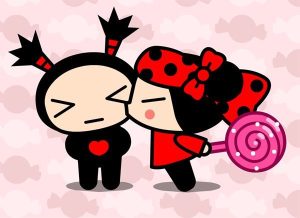
Last month Lisa Fantino spurred a discussion on Italian love phrases and we talked a bit about the differences between “ti voglio bene,” “ti amo,” and “sono innamorato con te.” Today, she’s back to dissect some new Italian words and answer the burning question on every teenage girl’s mind … “Where do I stand with this guy?”
Welcome, Lisa!
***
Now that you know the levels of love and how to express each of them, what do you do? What do you call that guy you’ve been living with (Mamma mia, without a marriage license)……..or the man you’ve spent every holiday with for the past three years………..or just the teenaged boy the girl next door is dating? It’s not simple.
In New York, you’re born……….you have a boyfriend (OK, several….dozen, but who’s counting). You get engaged (OK, maybe once or twice but that’s because the first was a jadrool (slang for the Italian word for cucumber … cetriolo). Then you get married.
It’s simple. Boyfriend – jadrool – fiancé – husband.
In Italy, not so fast!
Ragazzo – this is the word Italians use for boys, generally, but this is also the word that teenagers use for that special boy….the one who’s tossed away the key to their lock of love! He’s their boyfriend.
Fidanzato – this is a boy who’s much more committed. He’s your fiancé, the one you plan to marry some day, even if that day is five years away.
Compagno – this is the man with whom you reside without the benefit of marriage (although some might argue about the benefits of marriage!)
Here in The States, we make it pretty clear that “if ya like it than you shoulda put a ring on it,” and if not then you’re not my fiancé … you’re just my boyfriend. However, as a woman over the age of 18, I get strange looks when I refer to mio ragazzo. I’ve had one elderly Italian man go so far as to tease me and say in perfect English: “He’s your boyyyyyyyyyfriend!” emphasizing the word “boy.” And maybe that’s it – the boy versus the man.
I have been told that everyone in Italy now uses the word fidanzato to refer to a steady boyfriend, even if you’re not engaged; however, try to tell that to a man who clearly knows he’s not engaged and the girlfriend who wants to be. Or what about the couple in their 30s, 40s or 50s who is just living together, does the label “companion” make them less committed than a ring?
I believe this world is too tied up in labels and traditions and notions which complicate the simplest expressions of love. We raise or lower expectations depending on the culture instead of just going with your heart. Yet, when it comes to relationships, it shouldn’t matter what you call anyone but what two people know in their hearts to be true.
Cherrye’s note: I’ve also noticed more and more non-married Italians referring to their significant other as moglie and marito. Has anyone else noticed this? What else have you noticed about the labeling of boyfriends/girlfriends/fiances in the bel paese?
Lisa Fantino is an award-winning journalist and attorney and the Italy travel concierge and creative force behind Wanderlust Women Travel. She recently launched the Amalfi destination wedding site, Wanderlust Weddings. Her love of Amalfi has also inspired her to gather sterling silver jewelry and gifts inspired by the blues of the region at Amalfi Blu. In her spare time, she writes travel features for MNUI travel insurance and blogs as Lady Litigator.
Traveling to southern Italy? Click here to see how I can help you plan your trip.
Photo: Sfidaturritana03










I have noticed that for any one beyond their teens that they refer to their boyfriends as Fidanzato!
I notice a lot of teens who say “fidanzato.” I always think it is funny to hear a 14 yo say “fiance.”
Even teenagers around here use “fidanzato/a” — or the cuter version “fidanzatino/a” if they’re especially young, say younger than 16 or so. I would say “ragazzo/ragazza” is interchangeable until you reach a certain age and/or number of years together. As Lisa mentioned, it’s a bit odd for someone even in their 30s to have a “ragazzo” or “ragazza” (even if they’d still be called that independent of the relationship)!
Also, as Cherrye noted, it’s really common for cohabitating couples without the magical piece of paper to call each other “marito” or “moglie” — as I do with P, and he with me.
Compagno/a is a bit old-fashioned, IMHO, and tends to be used by people aged probably 45 and up who are living with someone but not married (and often has been married before)…although that, as with all of this, could very well vary greatly by region 🙂
Great observations, as always, Michelle. Thanks for sharing!
Very interesting. Most of my friends here say fidanzata/o or moglie/marito even if they are not engaged or married.
I think we Americans are too caught up in the ring/walk down the aisle thing.
I def. agree it is a big cultural difference. Still, I like the formality (or romance?) of an American engagement.
Yeah. Boyfriend may sound funny to them, but the newspapers refer to ragazzi or giovani until they’re the ripe age of like, 46. In the meantime, I can’t tell you how many times I’ve left people wondering whenever I mentioned hanging out with my girlfriend (I think it’s generational…young kids don’t use it anymore??!!)
Francesca
Burnt by the Tuscan Sun
Ha! That is funny.